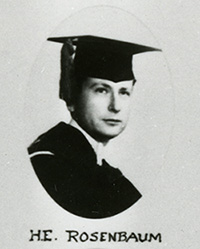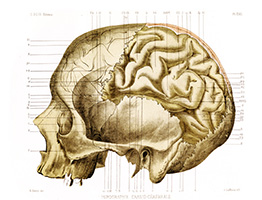Rosenbaum's Legacy: A History of Neurology
The Library and Historical Collections & Archives at Oregon Health & Science University (OHSU) are proud to promote discovery and scholarship in the history of neurology in honor of Dr. Herbert Rosenbaum. Our collaboration with the Department of Neurology includes collections of books and artifacts and a lecture series inviting scholars to share their research.
Dr. Rosenbaum was a student of the history of medicine in general and neurology in particular. He wanted to encourage medical students, neurology residents and faculty to become aware of those who came before us. He did this by generously giving us a large collection of historical neurology books. The OHSU Library created a special place for this collection, the Herbert Rosenbaum History of Neurology Room. He also donated money that allowed us to create a lovely space in which residents could study, the Rosenbaum Conference Room, located on the 12th floor of the Hatfield Research Building. Dr. Rosenbaum established an endowment to help maintain and enlarge the book collection. This endowment also helps to support an annual lecture on some topic related to the history of neurology, the Herbert Rosenbaum Memorial History of Neurology Lecture.
Residents often tell me that the history of neurology is all about “dead white guys.” There is certainly more than a grain of truth to that statement. But it is also true that usually the history of neurology is written by "living white guys" and, in the past, the contributions of women and people of color have been ignored. We have tried in recent years to ensure a more inclusive view of the history of neurology. In 2019, Dr. Lynda Yang lectured on the life and career of Dr. Augusta Klumpke. In 2020, Dr. Christopher Boes talked about Dr. Mary Broadfoot Walker. Both were successful neurologist researchers who overcame considerable obstacles because of their gender to go to medical school and obtain advanced training. Dr. Klumpke’s contributions to the work of her famous husband, Dr. Joseph Dejerine, and her own contributions following his death are not widely appreciated. (Most neurologists know about Klumpke's paralysis but few know that Dr. Klumpke was a woman.) Dr. Walker worked at a hospital in London that was not considered a place for scholarship and she carried a heavy clinical load. Yet she discovered the first effective treatment for myasthenia gravis and the association between hypokalemia and familial periodic paralysis. Her remarkable discovery of the effectiveness of physostigmine in treating myasthenia gravis was not accepted initially by the leading academic physicians of the time, some even denigrating her work. Her discovery was eventually acknowledged but her achievements did not gain her the fame that she richly deserved.
I encourage others to take time to learn about the history of neurology or the history of their own field and the contributions of a spectrum of people, including those who are quite famous and those who are largely or even completely forgotten.
Dennis Bourdette, M.D., Professor Emeritus and immediate past Chair, Department of Neurology
February 2021
Through the efforts made by the Library and Dr. Bourdette’s leadership on behalf of the Department of Neurology, there is renewed interest in learning about the history of the field. We in Neurology are seeing the clinicians and researchers who paved our way in a new light – as real and interesting people with important messages to convey.
Helmi Lutsep, M.D., Professor and Interim Chair, Department of Neurology
February 2021
Herbert Rosenbaum, M.D. (1924-2014)

Dr. Herbert Rosenbaum (1924-2014), earned his medical degree in 1949 here at the University of Oregon Medical School (now OHSU). He went on to become chief resident of the first neurology residency class at Barnes Hospital. During the Korean War, Rosenbaum served as a flight surgeon and neurologist for the Air Training Command of the U.S. Air Force.
Dr. Rosenbaum joined the faculty of the School of Medicine at Washington University in St. Louis in 1954 and taught the Department of Neurology’s practice of medicine course for 61 years.
A fellow of the American Academy of Neurology and a member and past president of the Clinical Society of Neurologists, Dr. Rosenbaum was dedicated to teaching the history and practice of neurology to students and residents.
Rosenbaum History of Neurology Collection

The Rosenbaum History of Neurology Collection includes classic works in neurology from the nineteenth and twentieth centuries. The collection is held in the Rosenbaum History of Neurology Room of the BICC building on Marquam Hill at OHSU (see below for more).
The 170 titles that make up the collection are available via the Library Catalog. See items in this collection.
Herbert Rosenbaum Memorial History of Neurology Lecture
The OHSU Department of Neurology sponsors this annual lecture. Lectures are live streamed and recorded—explore them below.
Upcoming events
November 6, 2025
Dr. Stephen Reich
A History of Parkinson’s Disease: In Five Parts
Streaming video of the lecture
October 23, 2024
Stefano Sandrone, Ph.D., SFHEA, M.Ed.
Rita-Levi Montalcini, Turin and the World
(lecture not recorded)
October 19, 2023
Manon Auffret, Pharm.D., Ph.D.
The Nineteenth Century Media Coverage of the Case of Phineas Gage: Myths and Facts
Streaming video of the lecture
Related article: Phineas Gage, in his own time: A medical case reconstructed from newly unearthed nineteenth-century archives
Thursday, October 27, 2022
Dr. Alexis Simpkins
Cedars Sinai Medical Center
A Historical Review of African Americans in Neurology: Focus on Women in Vascular Neurology
Streaming video of the lecture
Thursday, October 11, 2021
Dr. Elizabeth Coon
Mayo Clinic
Pioneering Women in Medicine and Neurology
Streaming video of the lecture
Thursday, November 12, 2020
Dr. Christopher Boes
Mayo Clinic
The Dr. Mary Broadfoot Walker Effect
Streaming video of the lecture
Tuesday, October 1, 2019
Dr. Lynda Yang
University of Michigan, Ann Arbor
Augusta Klumpke: Remembrance of a Pioneer
Streaming video of the lecture
Monday, November 5, 2018
Dr. Michael Aminoff
University of California San Francisco
Sir Charles Bell: Science, Style, and a Controversial Legacy
Streaming video of the lecture
Tuesday, November 7, 2017
Dr. Jock Murray, M.D.
Dalhousie University
From Leeches to the Human Genome: The History of Multiple Sclerosis Therapy Over the Centuries
Streaming video of the lecture
November 18, 2016
Dr. Michael Aminoff
Director of the Parkinson's Disease and Movement Disorders Clinic, University of California San Francisco
Brown-Séquard: The Man, His Syndrome, and Sensory Physiology
Streaming video of the lecture
November 17th, 2015
Christopher Goetz, M.D.
Professor, Department of Neurological Sciences and Department of Pharmacology
Director, Parkinson's Disease &Movement Disorder Program
Rush University Medical Center, Chicago, IL
Jean-Martin Charcot and the Role of Art in His Neurological Career
(Recording not available)